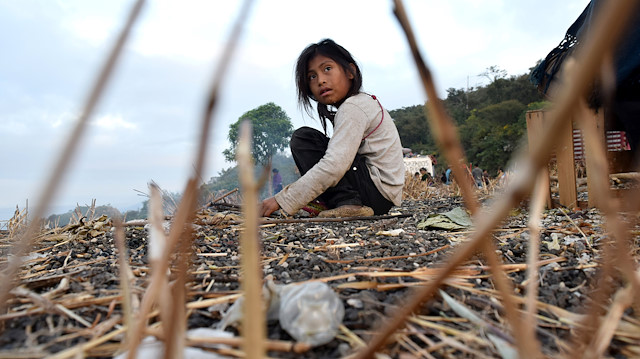

A girl rests as she walks with indigenous people displaced from their communities b
POLICIES, FUNDING FALL SHORT
The recommendations in the taskforce report urge governments and U.N. agencies to include communities in their efforts to gather data and better understand the displacement risks they face, so that more effective solutions can be crafted.
This is the kind of approach experts such as Robin Bronen, who heads the Alaska Institute for Justice, are already developing.
She has worked with three communities facing relocation in the far-northern U.S. state to craft guidelines on how they want to adapt to a warming environment now and later.
That process could be used by other people facing similar threats, she added.
The communities also have devised a new word in their local language, meaning "land collapse" as a result of climate change, which could draw attention to the phenomenon, the lawyer said.
And they have learned how to monitor local coastal erosion and permafrost melt themselves using simple tools, she said.
The U.N.'s Warner said the taskforce had worked to bring together many different organisations to share their expertise on migration linked to climate change.
That pool of knowledge could support development banks helping governments to relocate people, or Pacific church groups that own land they could offer to families seeking resettlement, she said.
There are also new challenges to be ironed out, she said, such as the legal provisions needed for a country to officially give a new home to citizens from another nation - a situation that may occur among low-lying island states in the Pacific.
Salote Soqo of the Unitarian Universalist Service Committee, a U.S.-based human rights group, said some progress had been made at the international level, including efforts to link emerging frameworks around migration.
Next week, for instance, in Morocco, states are due to adopt a global compact on migration that includes voluntary actions to help people uprooted by climate stresses.
But policies are being developed and implemented too slowly to resolve the magnitude and complexity of the problems communities face on the ground, Soqo added.
Harjeet Singh, the global lead on climate change for ActionAid International, lamented a lack of financial support for those already losing homes and land in places like India.
Discussions at the U.N. climate talks on providing funding to deal with loss and damage from global warming have made little headway, with rich countries reluctant to offer much beyond helping vulnerable nations afford weather insurance.
"Unless and until we also ensure a flow of money, we will not be able to deal with (migration)," Singh said. "Communities are losing their homes already. They need to be relocated now."
#UN
#Climate Change

